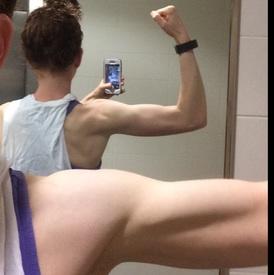Question about glycogen

oat_bran
Posts: 370 Member
If I understand correctly, when one starts eating very low carb or fasting , the body is forced to use glycogen (carbohydrates stored in the muscles and liver) for energy. Again if I remember correctly most people only can store about 400g (which varies depending on the amount of lean muscle and fitness) which is eqivalent to 2k calories. So after about 2 days of fasting or very low carb diet, the glycogens stores are fully depleted and the body starts to use fat as the main source of energy.
Now my question is, if a person doesn't eat low carb, but eats, lets say, 40-50% carbs and still has a daily caloric deficit, let's say 500 cal deficit, will the glycogen stores get eventually depleted as well? I understand that once there's a deficit the body also starts using fat for energy, but ut should use glycogen as well. And if there's a consistent daily deficit, if I understand correctly, the glycogen can't be replenished, so it should be all used up eventually? So does it mean that people who are in caloric deficit long enough will always have fully depleted glycogen stores and get their energy exclusively from food and body fat (or lean tissue in extreme cases) and that their daily deficit is almost entirely burned body fat?
Now my question is, if a person doesn't eat low carb, but eats, lets say, 40-50% carbs and still has a daily caloric deficit, let's say 500 cal deficit, will the glycogen stores get eventually depleted as well? I understand that once there's a deficit the body also starts using fat for energy, but ut should use glycogen as well. And if there's a consistent daily deficit, if I understand correctly, the glycogen can't be replenished, so it should be all used up eventually? So does it mean that people who are in caloric deficit long enough will always have fully depleted glycogen stores and get their energy exclusively from food and body fat (or lean tissue in extreme cases) and that their daily deficit is almost entirely burned body fat?
0
Replies
-
No. 40-50% of energy from carbs is usually more than enough to replenish glycogen stores, so you will not become "depleted", even with a deficit.
0 -
I eat 50-55% carbs and I deplete glycogen in a deficit (have a water-weight quick loss when I start eating at a deficit) and replenish glycogen (have a water-weight quick gain) when I eat at maintenance.
I don't know if it's full depletion, but it's at least partial.0 -
I think what you are asking is if you mostly use body fat to fuel a deficit either way. The answer is yes (and in both cases there will generally be some muscle loss no matter what, although you can take steps to minimize it -- carb percentage isn't the issue, though).
On LCHF, you burn way more fat, but that is because you eat more fat. You do not burn more body fat.
Example: person with maintenance of 2200 eating 1700.
LCHF: 10% carbs (170 cal), 25% protein (425 cal), and 65% fat (1105 cal) -- burns only 42-ish grams of carbs, so has to make ketones to fuel body and especially the brain. Overall burns about 1605 calories of fat: the 1105 eaten and 500 (or so, probably a little less) of body fat.
Not LCHF: 50% carbs (850 cal), 25% proten (425 cal), and 25% fat (425 cal) -- fuels brain with carbs from food, tops up glycogen stores (but on average they will not be full, since you are at a deficit, so you will not be adding fat), and burns (in addition to the carbs) 425+500 calories of fat, from what you ate plus, again, the 500 calories (or so) of body fat.
It is not true, of course, that you cannot burn fat when eating carbs -- when not intensely active you will be burning mostly fat much of the time, especially when resting or sleeping, and you use a combination even when active up to a point. Glycogen stores will generally not be totally full when you are consistently eating at a deficit.
2 -
No but you will deplete SOME glycogen which is why if your macros are really different from one day to the next you can see SOME water gains and losses. Each gram of glycogen requires about 3-4g water to store1
-
If you had ever got to the point of your glycogen running out you would know all about it it's the most appalling feeling of crushing fatigue and mental confusion. Runners would call it hitting the wall, cyclists call it bonking.
Energy substrate use isn't sequential like you seem to think. Using stored fat for energy is totally normal.
Reduced, not depleted, glycogen while in a deficit would be a better description.10 -
"Appalling feeling of fatigue and mental confusion". Yup. I called it "the Wobblies". I have no intention of ever going back to that place.2
-
"Appalling feeling of fatigue and mental confusion". Yup. I called it "the Wobblies". I have no intention of ever going back to that place.
Suddenly I seemed to have two flat tyres, cycling into a strong headwind, up a hill that wasn't there and when I stopped at a junction I forgot to unclip my shoes....
1 -
You are correct that you will use more glycogen if you don't have carbs in your gut. However, it is incorrect to think that a low carb diet will result in complete depletion. If that were happening people would be dying from low carb diets. Short-term what you eat can influence what your body uses for energy. Long-term it all balances out so that by the end of the week you will have the same amount of fat no matter what you choose to eat.3
-
If you had ever got to the point of your glycogen running out you would know all about it it's the most appalling feeling of crushing fatigue and mental confusion. Runners would call it hitting the wall, cyclists call it bonking.
Energy substrate use isn't sequential like you seem to think. Using stored fat for energy is totally normal.
Reduced, not depleted, glycogen while in a deficit would be a better description.
Exactly. When you hit mile 20 of your marathon and everything starts to go a bit wonky. Not a fun time, I can promise you that OP. Sadly I speak from experience.0 -
If you had ever got to the point of your glycogen running out you would know all about it it's the most appalling feeling of crushing fatigue and mental confusion. Runners would call it hitting the wall, cyclists call it bonking.
Energy substrate use isn't sequential like you seem to think. Using stored fat for energy is totally normal.
Reduced, not depleted, glycogen while in a deficit would be a better description.
I didn't think it was sequential. I know that one starts to use stored fat alongside glycogen as long as there isn't enough energy coming from food. What I was wondering is whether and how the glycogen stores get replenished if there's a consistent energy deficit. I was under the impression (probably wrong) that unless one is in ketosis, carbs from food - and in their absense glycogen - should be a prefered energy source for the body. Which led me to think that it should be depleted eventually.
But apparently, glycogen would be replaced, at least partially, even in a consistent deficit. So that answers my question.0 -
-
Good thread!2
-
Keep in mind that the body preferentially burns more fat than glycogen at rest regardless of your carb intake, that's why most people wouldn't deplete their glycogen in a moderate deficit if they are still eating a good amount of carbs and not doing higher intensity/longer duration workouts. They may have fewer grams stored at any given time than they would at maintenance, but complete depletion needs either going very low on carbs or engaging in activities that are higher intensity than resting for long enough to go through these stores.3
-
Glycogen can be replenished other than by dietary carbs. Consider the fate of ingested protein or recycling of lactic acid.1
-
amusedmonkey wrote: »Keep in mind that the body preferentially burns more fat than glycogen at rest regardless of your carb intake, that's why most people wouldn't deplete their glycogen in a moderate deficit if they are still eating a good amount of carbs and not doing higher intensity/longer duration workouts. They may have fewer grams stored at any given time than they would at maintenance, but complete depletion needs either going very low on carbs or engaging in activities that are higher intensity than resting for long enough to go through these stores.
I didn't know that actually, thank you! I thought the body always prefers burning carbs whether it's dietary carbs or glycogen. But turns out I was wrong!0
This discussion has been closed.
Categories
- All Categories
- 1.4M Health, Wellness and Goals
- 398.2K Introduce Yourself
- 44.7K Getting Started
- 261K Health and Weight Loss
- 176.4K Food and Nutrition
- 47.7K Recipes
- 233K Fitness and Exercise
- 462 Sleep, Mindfulness and Overall Wellness
- 6.5K Goal: Maintaining Weight
- 8.7K Goal: Gaining Weight and Body Building
- 153.5K Motivation and Support
- 8.4K Challenges
- 1.4K Debate Club
- 96.5K Chit-Chat
- 2.6K Fun and Games
- 4.8K MyFitnessPal Information
- 12 News and Announcements
- 21 MyFitnessPal Academy
- 1.6K Feature Suggestions and Ideas
- 3.2K MyFitnessPal Tech Support Questions











